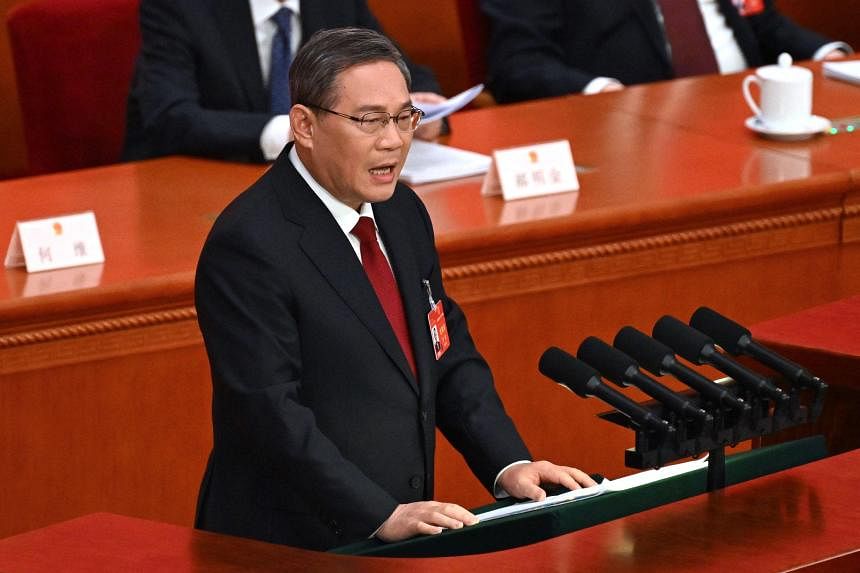BEIJING – China is gunning for an expansion of around 5 per cent in 2024, a target economists say is too ambitious and will require strong stimulus given its nagging property woes, deflation risks and poor business sentiments.
The headline growth target contained in Premier Li Qiang’s maiden government work report, delivered at the opening of China’s annual legislature meeting on March 5, follows 2023’s target of around 5 per cent, after the country failed to hit its 2022 goal of about 5.5 per cent.
Official data showed that China’s economy grew by 5.2 per cent in 2023 – a feat helped by government spending on infrastructure, as well as easing measures, including steps to boost liquidity in the market.
“In setting the growth rate at around 5 per cent, we have taken into account the need to boost employment and incomes, and prevent and defuse risks,” Mr Li said in delivering the work report at the Great Hall of the People.
In 2024, the government will aim to create 12 million new urban jobs, and the unemployment rate is projected to be about 5.5 per cent, the report showed. Policymakers also expect inflation to go up by 3 per cent. The projected increases are similar to 2023’s targets.
In 2023, besides inflation, which grew a meagre 0.2 per cent, China managed to hit its other targets, keeping to an unemployment rate of 5.2 per cent and creating 12.44 million jobs.
Military spending will rise to 1.67 trillion yuan (S$316 billion), an increase of 7.2 per cent, similar to the increase seen in 2023.
“Achieving this year’s targets will not be easy,” Mr Li acknowledged. “Domestically, owing to the impact of a three-year Covid-19 pandemic, many difficulties facing our economic recovery and development have yet to be resolved.”
These include the ongoing slump in the property market, weakened global demand and high local government debt, he pointed out.
Economists have cast doubts that China can hit its growth target in 2024, saying that much will depend on the strength of government support.
The International Monetary Fund in February projected that China will grow by 4.6 per cent in 2024.
Dr Dan Wang, chief economist at Hang Seng Bank in Shanghai, told The Straits Times that 2024’s growth target is “very ambitious”. She pointed to how China’s growth of 3 per cent in 2022 had provided a low base for the country to hit its target in 2023.
To hit 2024’s target, the government would need to spend a lot more on infrastructure, but “so far, I don’t see a concrete plan in (Tuesday’s report) to make that happen”, she pointed out.
One possibility is heavier investment in government-backed housing or manufacturing, but “it is hard to tell at this point”, she said.
But the government is banking on science and technology to help transform and lift the sluggish economy, by cultivating what Mr Li calls “new quality productive forces”. These refer to cutting-edge industries such as intelligent new-energy vehicles, hydrogen power and commercial space flight.
Public and private organisations will also pool resources “to make breakthroughs in core technologies in key fields, and step up research on disruptive and frontier technologies”, Mr Li said in his report.
Science and technological innovation have also replaced Covid-19 management as the top priority for the National Development Reform Commission, China’s economic planner.
The Finance Ministry’s draft budget, released on March 5, showed that 370.8 billion yuan has been allocated for science and technology, a 10 per cent jump from 2023.
Stimulating domestic demand remains its second priority, as it was in 2023, according to the commission’s draft plan for 2024, also released on March 5.
Meanwhile, the need to boost China’s worsening housing market is the biggest headache for policymakers, as new construction plunged by 20.4 per cent and investment fell 9.6 per cent in 2023, based on official data, though declines have been narrowing.
The downturn, which started in 2020 due to a regulatory clampdown to curb developers’ runaway debt, has hit the revenues of local governments that had previously relied heavily on land sales for funding, causing many to go into heavy debt.
Economists have also blamed the property crisis for weakened consumer demand, given that 70 per cent of Chinese household wealth is tied to property.
Mr Li said in his work report that the government will “move faster to foster a new development model for real estate”, as a way to control long-term risk to the economy.
Beijing will also further tighten oversight on government debt and revamp ways in which local officials raise revenue to better defuse financial dangers posed to the country, he added.
“We will refine real estate policies and meet justified financing demands of real estate enterprises,” Mr Li said.
Economics professor Hu Guangzhou at the China Europe International Business School in Shanghai said that despite facing strong economic headwinds, China’s growth potential “remains solid”.
“Impressive growth in the new energy-related sectors including electric vehicles in the past year is a testament to the resilience of the economy,” he told ST.
A January report by analysts at the non-profit Centre for Research on Energy and Clean Air based in Finland showed that clean energy sectors such as electricity grids, energy storage and electric vehicles were the largest drivers of China’s economic growth in 2023, accounting for 40 per cent of its expansion.
About 5,000 delegates are gathering in Beijing this week for China’s annual parliamentary sessions, known as Two Sessions, or lianghui.
On March 4, organisers announced that Mr Li will not be holding a traditional meet-the-press session at the end of the conclave, breaking a decades-long practice.

